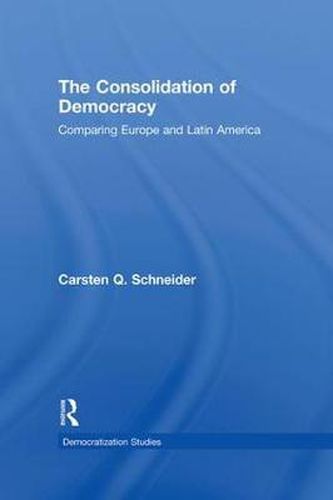Readings Newsletter
Become a Readings Member to make your shopping experience even easier.
Sign in or sign up for free!
You’re not far away from qualifying for FREE standard shipping within Australia
You’ve qualified for FREE standard shipping within Australia
The cart is loading…






This book investigates the successes and failures in consolidating those democratic regimes that emerged in Europe and Latin America in the last quarter of the 20th century.
The theoretical approach developed combines the most prominent political-institutional and socio-structural approaches to explaining the Consolidation of Democracy (CoD). Reinterpreting conventional claims, Schneider’s comparative analyses of 32 countries indicates that the driving force behind CoD is the fit between the institutional type of democracy and the societal context in terms of power dispersion. This book:
presents new data measuring dimensions of regime transition processes in Latin America, the Middle East and Northern Africa, as well as some former Soviet republics;
reassesses some core assumptions of the dominant transition paradigm;
discusses general methodological issues involved when investigating causally complex claims in comparative social research and presents fuzzy set Qualitative Comparative Analysis (fsQCA) as a valuable addition to the methodological tool kit of comparative social scientists.
This innovative and important volume will be of interest to political scientists, particularly those with an interest in democracy, democratization, comparative politics and comparative methodology.
$9.00 standard shipping within Australia
FREE standard shipping within Australia for orders over $100.00
Express & International shipping calculated at checkout
This book investigates the successes and failures in consolidating those democratic regimes that emerged in Europe and Latin America in the last quarter of the 20th century.
The theoretical approach developed combines the most prominent political-institutional and socio-structural approaches to explaining the Consolidation of Democracy (CoD). Reinterpreting conventional claims, Schneider’s comparative analyses of 32 countries indicates that the driving force behind CoD is the fit between the institutional type of democracy and the societal context in terms of power dispersion. This book:
presents new data measuring dimensions of regime transition processes in Latin America, the Middle East and Northern Africa, as well as some former Soviet republics;
reassesses some core assumptions of the dominant transition paradigm;
discusses general methodological issues involved when investigating causally complex claims in comparative social research and presents fuzzy set Qualitative Comparative Analysis (fsQCA) as a valuable addition to the methodological tool kit of comparative social scientists.
This innovative and important volume will be of interest to political scientists, particularly those with an interest in democracy, democratization, comparative politics and comparative methodology.